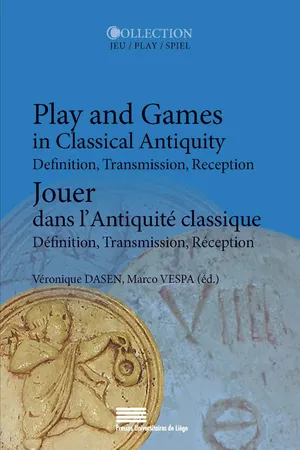
Jouer dans l’Antiquité classique/Play and Games in Classical Antiquity
Définition, Transmission, Réception/Definition, Transmission, Reception
- French
- ePUB (adaptée aux mobiles)
- Disponible sur iOS et Android
Jouer dans l’Antiquité classique/Play and Games in Classical Antiquity
Définition, Transmission, Réception/Definition, Transmission, Reception
À propos de ce livre
The European Research Council project (Locus Ludi. The Cultural Fabric of Play and Games in Classical Antiquity [ERC AdG # 741520]) investigates how play and games provide a privileged access to past societal norms, values, identities, and collective imaginary. People play all over the world and throughout history, but they do not play the same games, nor do they attribute the same meaning and function to play. This pluridisciplinary volume investigates how such an important part of ancient cultures can be methodologically reconstructed. A first series of chapters based on Greek and Roman texts and vocabulary propose an emic definition of play and games. Beyond the common association of child and play (in Greek, paidia, 'play', pais, 'child', and paideia, 'education', share the same root, in Latin ludus means 'play', 'school', and 'rethorical games'), ancient views are more complex and nuanced. The boundaries between sport, dance, rites and play are fluid and differ from our modern view. Case studies show how playful practices can be defined in material culture and iconographic representations. The second part of the volume focuses on Greek and Roman ludic heritage in ancient literature with particular attention to the cultural and discursive codes according to literary genre (oniromancy, proverbs, children's rhymes, lexicography...). Close studies assess the transmission of a predominantly oral heritage in collections, lexicons and commentaries ranging from the Roman imperial period to Byzantine times (proverbs, riddles, and children's lore). New insights are provided on crucial issues about cultural continuities and discontinuities, as well as the definition of so-called "traditional" games.
Foire aux questions
- Essentiel est idéal pour les étudiants et les professionnels qui aiment explorer un large éventail de sujets. Accédez à la bibliothèque Essentiel comprenant plus de 800 000 titres de référence et best-sellers dans les domaines du commerce, du développement personnel et des sciences humaines. Il comprend un temps de lecture illimité et la voix standard de la fonction Écouter.
- Complet est parfait pour les étudiants avancés et les chercheurs qui ont besoin d'un accès complet et illimité. Accédez à plus de 1,4 million de livres sur des centaines de sujets, y compris des titres académiques et spécialisés. L'abonnement Complet comprend également des fonctionnalités avancées telles que la fonction Écouter Premium et l'Assistant de recherche.
Veuillez noter que nous ne pouvons pas prendre en charge les appareils fonctionnant sur iOS 13 et Android 7 ou versions antérieures. En savoir plus sur l'utilisation de l'application.
Informations
Table des matières
- Couverture
- Informations bibliographiques
- Pages introductives
- Sommaire
- Liminaire
- Ancient Play and Games: in Search of a Definition
- I. Définition
- II. Transmission et réception
- Liste des contributeurs
- Résumés/Abstracts
- Bibliographie collective
- Index général
- Index des sources antiques